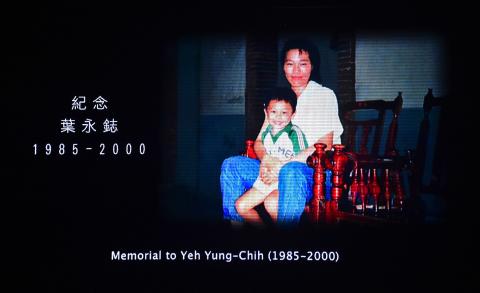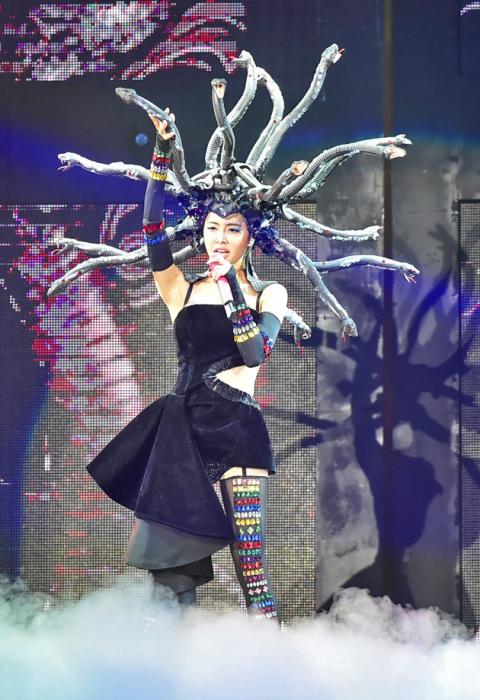On the morning of April 20, 2000, Yeh Yung-chih (葉永鋕) asked his teacher to go to the bathroom before class ended. A few minutes later, his lifeless body was found on the bathroom floor in a pool of blood. He was only 15.
Born in 1985, Yeh was a student at Gaoshu Junior High School in Pingtung County’s Gaoshu Township (高樹) who had been constantly bullied by his schoolmates due to his alleged effeminate behavior.
“After he entered junior high, he told me that some bullies would seize him and pull his pants off in the school toilet,” recalled his mother, Chen Chun-ju (陳君汝), who described him as a nice, tender and considerate boy who liked to cook.

Photo: Pan Shao-tang, Taipei Times
Chen repeatedly complained, but school officials did nothing. As a result, her son didn’t dare to enter the bathroom during recess. He usually did so five minutes before or after a break just to avoid harassment, or asked his friends to accompany him.
The Institute of Forensic Medicine under the Ministry of Justice concluded that Yeh died of severe brain injuries due to head trauma after suffering a heart attack and collapsing.
However, National Taiwan University’s College of Medicine disagreed, arguing that it was unlikely for a young and healthy boy to suddenly die of a heart attack since he did not have any medical history of heart problems.

Photo: Pan Shao-tang, Taipei Times
SOCIAL IMPACT
In 2006, the Taiwan High Court’s Kaohsiung Branch sentenced the school’s principal and two school officials to five months, four months and three months, respectively, in prison for “neglecting the degree of care required by their occupation.”
But Yeh’s death has remained an unsolved mystery because there was no concrete evidence to show that his death was the result of bullying. Although nobody was convicted of murder, the long-term bullying that he had endured for almost three years almost certainly contributed to the tragedy. What happened to Yeh might never be known.
Embracing the Rose Boy (擁抱玫瑰少年), a book written in memory of Yeh by the Taiwan Gender Equity Education Association (台灣性別平等教育協會), was published by Fembooks Publishing House and Bookstore (女書文化公司) in 2006. The association coined the term “rose boy” to refer to boys with feminine gender characteristics, calling on people to respect such differences.
Following Yeh’s death, the Ministry of Education transformed its Gender Equality Education Committee (兩性平等教育委員會) — literally translated as “the committee of equality education of two sexes” in Chinese — into the broader Gender Equity Education Committee (性別平等教育委員會) to promote diverse gender education beyond the two gender stereotypes.
The government also enacted the Gender Equity Education Act (性別平等教育法) in 2004, stating that the “school shall provide a gender-fair learning environment, respect and give due consideration to students, faculty and staff with a different gender, gender temperament, gender identity and sexual orientation.”
Still, bias, discrimination and bullying continue to exist on and off campus across the nation.
THE DOCUMENTARY FILM
In November last year, director Hou Chi-jan (侯季然) released a documentary, The Rose Boy (玫瑰少年, www.youtube.com/watch?v=V_M9ZId2QAY), in tribute to Yeh.
Singer Jolin Tsai (蔡依林), an active supporter of the lesbian, gay, bisexual and transgender (LGBT) community, played the five-minute documentary at her Taipei concerts in November, as tens of thousands of fans were moved to tears.
A report about the video became the most-read story on the Liberty Times’ (the Taipei Times’ sister newspaper) Web site, and many remain curious about the events surrounding the unsolved death.
The documentary shows Yeh’s mother giving a speech in 2010 at the Kaohsiung LGBT Pride Parade (高雄同志遊行), where she encouraged participants who faced similar experiences to be brave.
“Don’t cry kids, because it will make us look cowardly,” she said. “We haven’t done anything wrong, and we are fighting for our rights.”
Unfortunately, neither Taiwanese officials nor the general public seem to have learned much from Yeh’s death, while teens who don’t conform to gender stereotypes are bullied everyday.
Even going to the toilet at school could be a nightmare for them.
Yeh would have turned 31 if he were still alive and could have become the chef that he had always dreamed of being.
As Tsai said at one of her Taipei concerts: “We are always looking for acceptance by others and have been taught what is ‘normal’ while forgetting to tolerate others.” The Taipei Watcher highly recommends this inspiring documentary, and hopefully Yeh’s tragic story can serve as a lesson so that a tragedy like this will never happen again.

Taiwan has next to no political engagement in Myanmar, either with the ruling military junta nor the dozens of armed groups who’ve in the last five years taken over around two-thirds of the nation’s territory in a sprawling, patchwork civil war. But early last month, the leader of one relatively minor Burmese revolutionary faction, General Nerdah Bomya, who is also an alleged war criminal, made a low key visit to Taipei, where he met with a member of President William Lai’s (賴清德) staff, a retired Taiwanese military official and several academics. “I feel like Taiwan is a good example of

March 2 to March 8 Gunfire rang out along the shore of the frontline island of Lieyu (烈嶼) on a foggy afternoon on March 7, 1987. By the time it was over, about 20 unarmed Vietnamese refugees — men, women, elderly and children — were dead. They were hastily buried, followed by decades of silence. Months later, opposition politicians and journalists tried to uncover what had happened, but conflicting accounts only deepened the confusion. One version suggested that government troops had mistakenly killed their own operatives attempting to return home from Vietnam. The military maintained that the

Before the last section of the round-the-island railway was electrified, one old blue train still chugged back and forth between Pingtung County’s Fangliao (枋寮) and Taitung (台東) stations once a day. It was so slow, was so hot (it had no air conditioning) and covered such a short distance, that the low fare still failed to attract many riders. This relic of the past was finally retired when the South Link Line was fully electrified on Dec. 23, 2020. A wave of nostalgia surrounded the termination of the Ordinary Train service, as these train carriages had been in use for decades

Lori Sepich smoked for years and sometimes skipped taking her blood pressure medicine. But she never thought she’d have a heart attack. The possibility “just wasn’t registering with me,” said the 64-year-old from Memphis, Tennessee, who suffered two of them 13 years apart. She’s far from alone. More than 60 million women in the US live with cardiovascular disease, which includes heart disease as well as stroke, heart failure and atrial fibrillation. And despite the myth that heart attacks mostly strike men, women are vulnerable too. Overall in the US, 1 in 5 women dies of cardiovascular disease each year, 37,000 of them